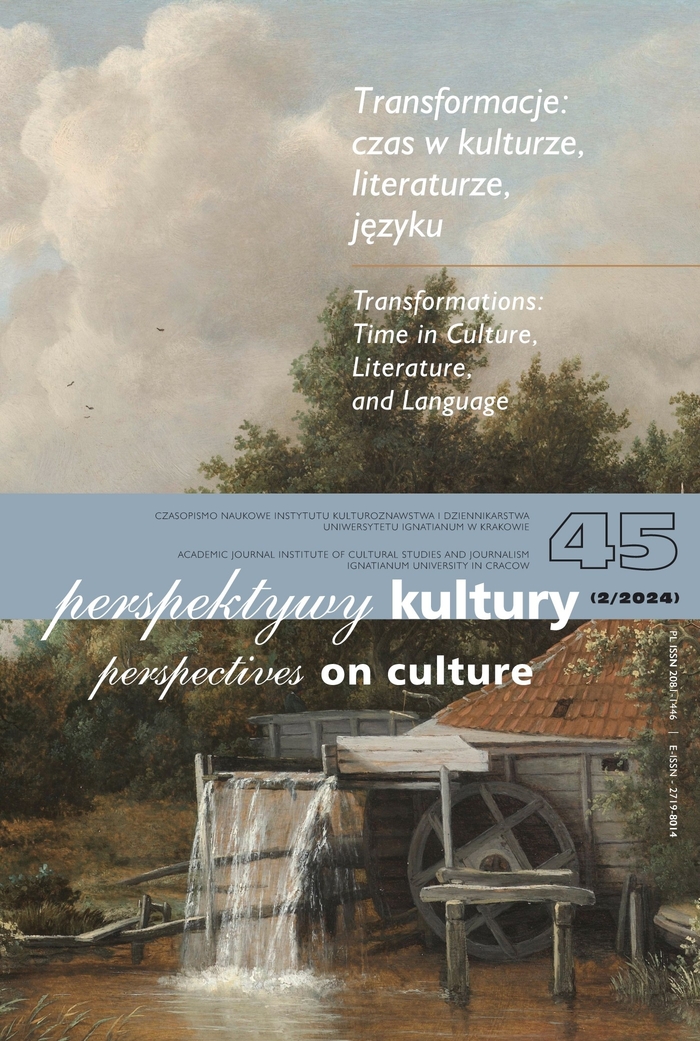Prosochê i przeobrażenie siebie w poezji Geoffreya Chaucera
Abstrakt
Tematem niniejszego artykułu jest pojęcie prosochê, definiowane jako skupienie się na chwili obecnej, w poezji Geoffreya Chaucera. Mimo iż sam termin grecki nie pojawia się w utworach Chaucera, to idea uważnej refleksji nad samym sobą, innymi oraz kosmosem jest mocno zaakcentowana przez angielskiego poetę, szczególnie w jego poezji dworskiej, która przedstawia postaci pogrążone w apatii oraz potrzebujące wewnętrznej przemiany. Poeta podkreśla transformacyjną moc uwagi poprzez wezwanie do przebudzenia, którego przykłady zostaną omówione w niniejszym artykule na podstawie dwóch utworów: Księga księżnej oraz Troilus i Criseyda. To, w jaki sposób poeta traktuje temat prosochê, świadczy o jego twórczym podejściu do źródeł, jak również o wrażliwości moralnej i filozoficznej refleksji.
Bibliografia
Adler, G. (2022). Chaucer and the Ethics of Time. Cardiff: University of Wales Press.
Astell, A. W. (1994). Job, Boethius, and Epic Truth. Ithaca and London: Cornell University Press.
Bennett, J. A. W. (1982). Nosce Te Ipsum: Some Medieval and Modern Interpretations. In: Piero Boitani (ed.), The Humane Medievalist and Other Essays in English Literature and Learning, from Chaucer to Eliot. Roma: Edizioni di Storia e Letteratura, 135–172.
Benson, L. D. (ed.) (1988). The Riverside Chaucer. Oxford: Oxford University Press.
Burnley, J. D. (1979). Chaucer’s Language and the Philosophers’ Tradition. Cambridge: D. S. Brewer; Totowa: Rowman & Littlefield.
Christie, D. E. (2012). The Blue Sapphire of the Mind. Oxford: Oxford University Press.
https://doi.org/10.1093/acprof:oso/9780199812325.001.0001.
DeMarco, P. (2008). Violence, Law, and Ciceronian Ethics in Chaucer’s Tale of Melibee. Studies in the Age of Chaucer 30, 125–169. https://doi.org/10.1353/sac.0.0027.
Eldridge, R. (2009). Introduction. In R. Eldridge (ed.), The Oxford Handbook of Philosophy and Literature. Oxford: Oxford University Press, 3–16. https://doi.org/10.1093/oxfordhb/9780195182637.003.0001.
Epictetus. (1983). Handbook of Epictetus, trans. by Nicholas White. Indianapolis, IN: Hackett Publishing Company.
Fumo, J. C. (2015). Making Chaucer’s Book of the Duchess. Textuality and Reception. Cardiff: University of Wales Press.
Gilbert, J. (2011). Living Death in Medieval French and English Literature. Cambridge: Cambridge University Press.
Hadot, P. (1995). Philosophy as a Way of Life. Spiritual Exercises from Socrates to Foucault, ed. with an introduction by Arnold I. Davidson; trans. by Michael Chase. Oxford, UK, and Cambridge, USA: Blackwell.
Heffernan, C. F. (1990). Chaucer’s Troilus and Criseyde: The Disease of Love and Courtly Love. Neophilologus, vol. 74, 294–309. https://doi.org/10.1007/BF00310540.
Kotva, S. (2020). Effort and Grace: On the Spiritual Exercise of Philosophy. London; New York: Bloomsbury.
Lehman, J. S. (2012). Lady Philosophy as Physician. In: Boethius, Consolation of Philosophy, ed. and trans. by Scott Goins and Barbara H. Wyman. Ignatius Critical Editions. San Francisco: Ignatius Press, 187–212.
Lynch, K. L. (2000). Chaucer’s Philosophical Vision. Cambridge: D. S. Brewer.
Miller, R. P. (ed.) (1977). Chaucer. Sources and Backgrounds. New York: Oxford University Press.
Mogan, J. J. (1969). Chaucer and the Theme of Mutability. The Hague, Paris: Mouton.
Murton, M. (2016). Secular Consolation in Chaucer’s Complaint of Mars. Studies in the Age of Chaucer 38, 75–107. https://doi.org/10.1353/sac.2016.0002.
Phillips, H. (1997). The Book of the Duchess. Introduction. In: H. Phillips and N. Havely (eds.), Chaucer’s Dream Poetry. London and New York: Longman, 29–49.
Pigliucci, M. (2022). Prosochê as Stoic Mindfulness. In: R. Repetti (ed.), Routledge Handbook on the Philosophy of Meditation. Routledge, Taylor & Francis Group, 371–382.
https://www.routledgehandbooks.com/doi/10.4324/9781003127253-31.
Rosenfeld, J. (2013). Ethics and Enjoyment in Late Medieval Poetry. Love after Aristotle. Cambridge: Cambridge University Press.
Seneca. (2007). Dialogues and Essays, trans. by J. Davie. Oxford: Oxford University Press.
Seneca. (2021). Moral Letters to Lucilius, vol. I, II, III, trans. by R. M. Gummere. London: William Heinemann.
Sherman, N. (2021). Stoic Wisdom: Ancient Lessons for Modern Resilience. Oxford: Oxford University Press.
Shimomura, S. (2013). The Walking Dead in Chaucer’s Knight’s Tale. The Chaucer Review, vol. 48, no. 1, 1–37. https://doi.org/10.5325/chaucerrev.48.1.0001.
Tran, D. Q. (2021). Attention, Reverence, and Devotion. In: S. K. Dhiman (ed.), The Routledge Companion to Mindfulness at Work. London and New York: Routledge, 463–478.
https://www.routledgehandbooks.com/doi/10.4324/9780429244667-27.
Wack, M. (1986). Pandarus, Poetry, and Healing. Studies in the Age of Chaucer, vol. 1986, no. 1, 127–133. https://doi.org/10.1353/sac.1986.0061.
Wynne-Davies, M. (ed.) (1995). The Bloomsbury Guide to English Literature. London: Bloomsbury Publishing Place.
Copyright (c) 2024 Perspektywy Kultury

Utwór dostępny jest na licencji Creative Commons Uznanie autorstwa – Bez utworów zależnych 4.0 Międzynarodowe.
Autor, zgłaszając swój artykuł, wyraża zgodę na korzystanie przez Wydawnictwo Uniwersystet Ignatianum z utworu na następujących polach eksploatacji:
- utrwalania utworu w formie papierowej, a także na nośniku cyfrowym lub magnetycznym;
- zwielokrotnienia utworu dowolną techniką, bez ograniczenia ilości wydań i liczby egzemplarzy;
- rozpowszechniania utworu i jego zwielokrotnionych egzemplarzy na jakimkolwiek nośniku, w tym wprowadzenia do obrotu, sprzedaży, użyczenia, najmu;
- wprowadzenia utworu do pamięci komputera;
- rozpowszechniania utworu w sieciach informatycznych, w tym w sieci Internet;
- publicznego wykonania, wystawienia, wyświetlenia, odtworzenia oraz nadawania i reemitowania, a także publicznego udostępniania utworu w taki sposób, aby każdy mógł mieć do niego dostęp w miejscu i czasie przez siebie wybranym.
Wydawca zobowiązuje się szanować osobiste prawa autorskie do utworu.





